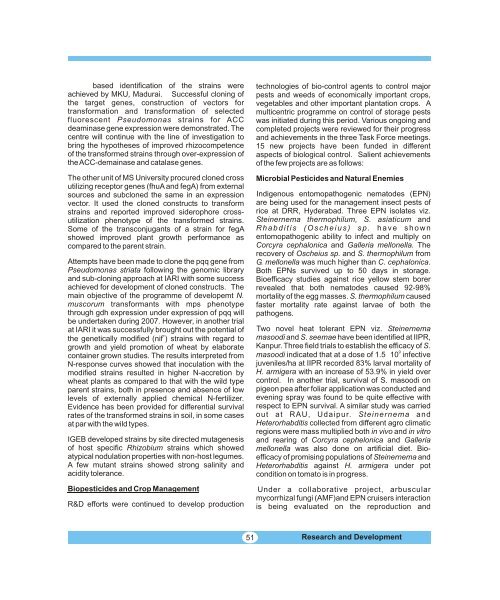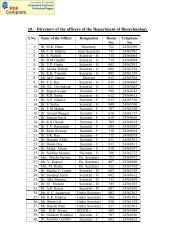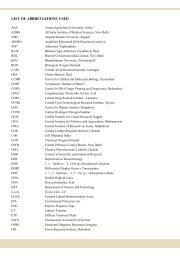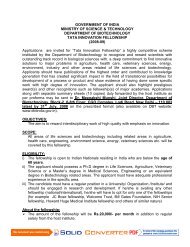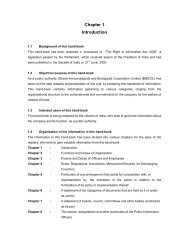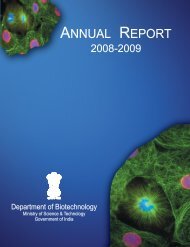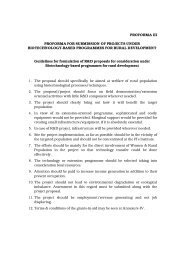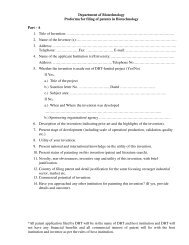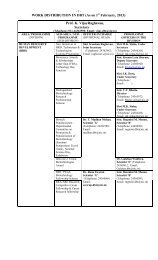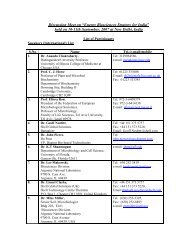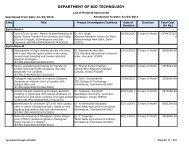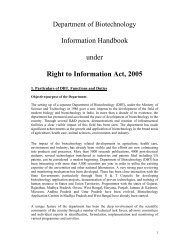ANNUAL REPORT - Department of Biotechnology
ANNUAL REPORT - Department of Biotechnology
ANNUAL REPORT - Department of Biotechnology
Create successful ePaper yourself
Turn your PDF publications into a flip-book with our unique Google optimized e-Paper software.
ased identification <strong>of</strong> the strains were<br />
achieved by MKU, Madurai. Successful cloning <strong>of</strong><br />
the target genes, construction <strong>of</strong> vectors for<br />
transformation and transformation <strong>of</strong> selected<br />
fluorescent Pseudomonas strains for ACC<br />
deaminase gene expression were demonstrated. The<br />
centre will continue with the line <strong>of</strong> investigation to<br />
bring the hypotheses <strong>of</strong> improved rhizocompetence<br />
<strong>of</strong> the transformed strains through over-expression <strong>of</strong><br />
the ACC-demainase and catalase genes.<br />
The other unit <strong>of</strong> MS University procured cloned cross<br />
utilizing receptor genes (fhuA and fegA) from external<br />
sources and subcloned the same in an expression<br />
vector. It used the cloned constructs to transform<br />
strains and reported improved siderophore crossutilization<br />
phenotype <strong>of</strong> the transformed strains.<br />
Some <strong>of</strong> the transconjugants <strong>of</strong> a strain for fegA<br />
showed improved plant growth performance as<br />
compared to the parent strain.<br />
Attempts have been made to clone the pqq gene from<br />
Pseudomonas striata following the genomic library<br />
and sub-cloning approach at IARI with some success<br />
achieved for development <strong>of</strong> cloned constructs. The<br />
main objective <strong>of</strong> the programme <strong>of</strong> developemt N.<br />
muscorum transformants with mps phenotype<br />
through gdh expression under expression <strong>of</strong> pqq will<br />
be undertaken during 2007. However, in another trial<br />
at IARI it was successfully brought out the potential <strong>of</strong><br />
+<br />
the genetically modified (nif ) strains with regard to<br />
growth and yield promotion <strong>of</strong> wheat by elaborate<br />
container grown studies. The results interpreted from<br />
N-response curves showed that inoculation with the<br />
modified strains resulted in higher N-accretion by<br />
wheat plants as compared to that with the wild type<br />
parent strains, both in presence and absence <strong>of</strong> low<br />
levels <strong>of</strong> externally applied chemical N-fertilizer.<br />
Evidence has been provided for differential survival<br />
rates <strong>of</strong> the transformed strains in soil, in some cases<br />
at par with the wild types.<br />
IGEB developed strains by site directed mutagenesis<br />
<strong>of</strong> host specific Rhizobium strains which showed<br />
atypical nodulation properties with non-host legumes.<br />
A few mutant strains showed strong salinity and<br />
acidity tolerance.<br />
Biopesticides and Crop Management<br />
R&D efforts were continued to develop production<br />
technologies <strong>of</strong> bio-control agents to control major<br />
pests and weeds <strong>of</strong> economically important crops,<br />
vegetables and other important plantation crops. A<br />
multicentric programme on control <strong>of</strong> storage pests<br />
was initiated during this period. Various ongoing and<br />
completed projects were reviewed for their progress<br />
and achievements in the three Task Force meetings.<br />
15 new projects have been funded in different<br />
aspects <strong>of</strong> biological control. Salient achievements<br />
<strong>of</strong> the few projects are as follows:<br />
Microbial Pesticides and Natural Enemies<br />
Indigenous entomopathogenic nematodes (EPN)<br />
are being used for the management insect pests <strong>of</strong><br />
rice at DRR, Hyderabad. Three EPN isolates viz.<br />
Steinernema thermophilum, S. asiaticum and<br />
Rhabditis (Oscheius) sp. have shown<br />
entomopathogenic ability to infect and multiply on<br />
Corcyra cephalonica and Galleria mellonella. The<br />
recovery <strong>of</strong> Oscheius sp. and S. thermophilum from<br />
G. mellonella was much higher than C. cephalonica.<br />
Both EPNs survived up to 50 days in storage.<br />
Bioefficacy studies against rice yellow stem borer<br />
revealed that both nematodes caused 92-98%<br />
mortality <strong>of</strong> the egg masses. S. thermophilum caused<br />
faster mortality rate against larvae <strong>of</strong> both the<br />
pathogens.<br />
Two novel heat tolerant EPN viz. Steinernema<br />
masoodi and S. seemae have been identified at IIPR,<br />
Kanpur. Three field trials to establish the efficacy <strong>of</strong> S.<br />
9<br />
masoodi indicated that at a dose <strong>of</strong> 1.5 10 infective<br />
juveniles/ha at IIPR recorded 83% larval mortality <strong>of</strong><br />
H. armigera with an increase <strong>of</strong> 53.9% in yield over<br />
control. In another trial, survival <strong>of</strong> S. masoodi on<br />
pigeon pea after foliar application was conducted and<br />
evening spray was found to be quite effective with<br />
respect to EPN survival. A similar study was carried<br />
out at RAU, Udaipur. Steinernema and<br />
Heterorhabditis collected from different agro climatic<br />
regions were mass multiplied both in vivo and in vitro<br />
and rearing <strong>of</strong> Corcyra cephelonica and Galleria<br />
mellonella was also done on artificial diet. Bioefficacy<br />
<strong>of</strong> promising populations <strong>of</strong> Steinernema and<br />
Heterorhabditis against H. armigera under pot<br />
condition on tomato is in progress.<br />
Under a collaborative project, arbuscular<br />
mycorrhizal fungi (AMF)and EPN cruisers interaction<br />
is being evaluated on the reproduction and<br />
51 Research and Development


